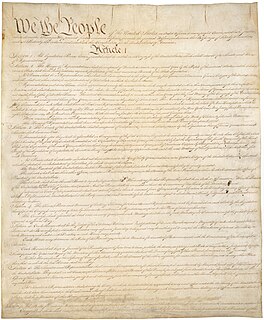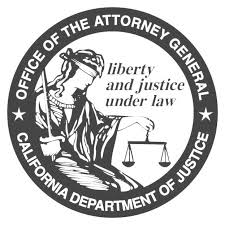
In United States law, ripeness refers to the readiness of a case for litigation; "a claim is not ripe for adjudication if it rests upon contingent future events that may not occur as anticipated, or indeed may not occur at all." For example, if a law of ambiguous quality has been enacted but never applied, a case challenging that law lacks the ripeness necessary for a decision.
The judiciary is the system of courts that interprets and applies the law in a country, or an international community. The first legal systems of the world were set up to prevent citizens to settle conflicts with violence.
The burden of proof is the obligation of a party in a trial to produce the evidence that will prove the claims they have made against the other party. In a legal dispute, one party is initially presumed to be correct and gets the benefit of the doubt, while the other side bears the burden of proof. When a party bearing the burden of proof meets its burden, the burden of proof switches to the other side. Burdens may be of different kinds for each party, in different phases of litigation. The burden of production is a minimal burden to produce at least enough evidence for the trier of fact to consider a disputed claim. After litigants have met the burden of production and their claim is being considered by a trier of fact, they have the burden of persuasion, that enough evidence has been presented to persuade the trier of fact that their side is correct. There are different standards of persuasiveness ranging from a preponderance of the evidence, where there is just enough evidence to tip the balance, to proof beyond a reasonable doubt, as in United States criminal courts.
The Dormant Commerce Clause, or Negative Commerce Clause, in American constitutional law, is a legal doctrine that courts in the United States have inferred from the Commerce Clause in Article I of the US Constitution. The Dormant Commerce Clause is used to prohibit state legislation that discriminates against interstate or international commerce.
In administrative law, rule-making is the process that executive and independent agencies use to create, or promulgate, regulations. In general, legislatures first set broad policy mandates by passing statutes, then agencies create more detailed regulations through rulemaking.
United States v. Carolene Products Company, 304 U.S. 144 (1938), was an April 25, 1938 decision by the United States Supreme Court. The case affirmed the presumption of constitutionality and deferential review for most legislation, but in "Footnote Four," the Court indicated that a higher level of scrutiny should apply to cases involving: (1) a specific constitutional prohibition such as the Bill of Rights, (2) legislation restricting the political process, and (3) legislation directed at discrete and insular minorities.
Judicial notice is a rule in the law of evidence that allows a fact to be introduced into evidence if the truth of that fact is so notorious or well known, or so authoritatively attested, that it cannot reasonably be doubted. This is done upon the request of the party seeking to rely on the fact at issue. Facts and materials admitted under judicial notice are accepted without being formally introduced by a witness or other rule of evidence, and they are even admitted if one party wishes to lead evidence to the contrary.
United States federal administrative law encompasses statutes, common law, and directives issued by the Office of Information and Regulatory Affairs in the Executive Office of the President, that together define the extent of powers and responsibilities held by administrative agencies of the United States Government. The executive, legislative, and judicial branches of the U.S. federal government cannot always directly perform their constitutional responsibilities. Specialized powers are therefore delegated to an agency, board, or commission. These administrative governmental bodies oversee and monitor activities in complex areas, such as commercial aviation, medical device manufacturing, and securities markets.
Bi-Metallic Investment Co. v. State Board of Equalization, 239 U.S. 441 (1915), was a United States Supreme Court case which held that due process protections attach only to administrative activities in which a small number of people are concerned, who are exceptionally affected by the act, in each case upon individual grounds. By contrast, rule-making or quasi-legislative activities that affect a large number of people without regard to the facts of individual cases do not implicate due process protections. It is an important case in United States administrative law.
Forum non conveniens (FNC) is a (mostly) common law legal doctrine whereby courts may refuse to take jurisdiction over matters where there is a more appropriate forum available to the parties. As a doctrine of the conflict of laws, forum non conveniens applies between courts in different countries and between courts in different jurisdictions in the same country. Forum non conveniens is not applicable between counties or federal districts within a state.

The adequate and independent state ground doctrine is a doctrine of United States law governing the power of the U.S. Supreme Court to review judgments entered by state courts.

Pacific Legal Foundation(PLF) is a conservative/libertarian public interest law firm in the United States. PLF was established for the purpose of defending and promoting individual and economic freedom in the courts. To that end, PLF attorneys litigate, file amicus curiae briefs, and participate in administrative proceedings with the goal of supporting equality under the law, freedom of speech and association, property rights, economic liberty, and separation of powers.
Griffin v. California, 380 U.S. 609 (1965), was a United States Supreme Court case in which the Court ruled, by a 6-2 vote, that it is a violation of a defendant's Fifth Amendment rights for the prosecutor to comment to the jury on the defendant's declining to testify, or for the judge to instruct the jury that such silence is evidence of guilt.
Conley v. Gibson, 355 U.S. 41 (1957), was a case decided by the Supreme Court of the United States that provided a basis for a broad reading of the "short plain statement" requirement for pleading under Rule 8 of the Federal Rules of Civil Procedure.

The law of the United States comprises many levels of codified and uncodified forms of law, of which the most important is the United States Constitution, the foundation of the federal government of the United States. The Constitution sets out the boundaries of federal law, which consists of Acts of Congress, treaties ratified by the Senate, regulations promulgated by the executive branch, and case law originating from the federal judiciary. The United States Code is the official compilation and codification of general and permanent federal statutory law.
Motor Vehicles Manufacturers Association v. State Farm Mutual Automobile Insurance Co., 463 U.S. 29 (1983), is a United States Supreme Court decision concerning regulations requiring passive restraints in cars. In it, the Court struck down an order by the National Highway Traffic Safety Administration rescinding regulations that required either airbags or automatic seat belts in new cars.
National Institute of Family and Life Advocates v. Becerra, 585 U.S. ___ (2018), was a case before the Supreme Court of the United States addressing the constitutionality of California's FACT Act, which mandated that crisis pregnancy centers provide certain disclosures about state services. The law required that licensed centers post visible notices that other options for pregnancy, including abortion, are available from state-sponsored clinics. It also mandated that unlicensed centers post notice of their unlicensed status. The centers, typically run by Christian non-profit groups, challenged the act on the basis that it violated their free speech. After prior reviews in lower courts, the case was brought to the Supreme Court, asking "Whether the disclosures required by the California Reproductive FACT Act violate the protections set forth in the free speech clause of the First Amendment, applicable to the states through the 14th Amendment."









